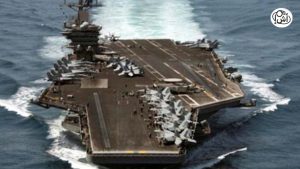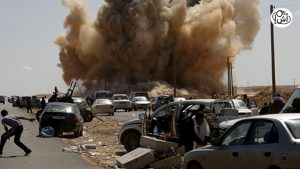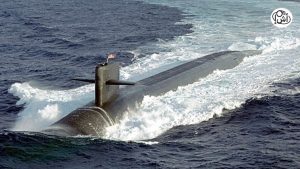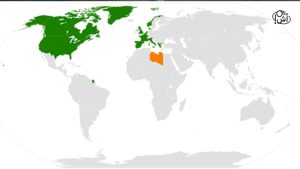Africa has not lost sight of traditional European colonialism, and this resource-rich continent has been fondling their ideas and is a destination for their continuous efforts to acquire these resources, through modern and sophisticated methods.
Modern colonialism
European colonization of Africa succeeded in creating loyal regimes led by autocrats, which paved the way for its return to the continent, by Western politicians coveting the resources of this country.
Libya witnessed the implementation of the neo-colonial scenario in 2011 through a step aimed at seizing the resources of this oil-rich country, which has a strategic geographical location.
In 1951, a new independent Libya emerged, after Cyrenaica was integrated into the federal system with the western regions of Tripolitania and Fezzan and transformed into a constitutional monarchy led by King Idris al-Senussi.
Senussi was unable to overcome internal divisions and differences between regions and clans, so Muammar Gaddafi seized power in 1969 after a military coup, and Libya turned into a rich country, benefiting from its abundant resources, and – to some extent – the relationship with the West turned into a rival, with which the rules of the game changed.
The Arab Spring, which began in 2011, marked the beginning of a wide range of steps to topple Gaddafi, smash and fragment Libya, and divide it into warring tribal areas.
The Fifth Basis of Colonialism: Divide and Rule
civil war
The events that took place in Benghazi on 15 February 2011 marked the beginning of a scenario that would last several months leading to the assassination of the country’s leader, the establishment of several rival decision-making centers and the start of direct foreign interference in Libyan affairs.
Lawyer and human rights activist Fathi Tarbil arrested, demonstrations, an armed uprising in Benghazi, military clashes over oil refineries, and mass executions. Libya has become mired in the vortex of civil war.
For the West, these conditions established military intervention, modern-style colonialism. NATO forces began invading Libya equipped with the latest weapons under the pretext of “humanitarian intervention”.

NATO Forces
Many analyses tend to believe that Qaddafi’s rule created the ground for strife among tribes, for example, in Tripoli the majority supported his rule, and in Cyrenaica the majority opposed it.
The low level of citizens’ freedoms and rights, high levels of corruption, and the unfair distribution of oil revenues have also fueled the outbreak of events. However, numerous documents indicate that there was a preconceived Western plan to create this uprising and later exploit it for military intervention.
Whatever the reasons, since 18 February anti-government unrest has escalated in Benghazi into an armed insurgency, and the Libyan army has begun to witness successive defections of forces that have gradually moved to the side of the opposition.
The head of Libya’s Interior Ministry, General Abdel Fattah Younis, defected from Gaddafi and called on the army to move on to the side of the protesters. Then in the city of Tobruk another part of the forces moved to the side of the opposition.
On March 17, after a month of hostilities, the conflict took an upward curve amid the risk of reprisals and purges that threatened Benghazi’s one million residents.
On the night of 17-18 March, the United Nations Security Council attempted to adopt Resolution 1973 allowing NATO military forces to invade the country. Russia and China objected to the decision.
Interestingly, the Western invasion plan was already ready. On March 19 the first offensive by the troops began. The United States launched an attack from pro-Western Tunisian territory. The operation bore the name “Dawn of the Odyssey”.

The rapid implementation of the military operation by NATO forces opens the door to many questions: How long does it take to prepare for the operation? How long does it take to prepare a complex logistical plan for an attack from a neighboring country by a group of thousands? How long does it take to reconnaissance, delivery of equipment and ammunition to manpower, transportation to storming sites, approval of the final plan by military administrations and approval of heads of state? Well, definitely not in a day.
Was the takeover of Libya in the works long before March 2011? It is neocolonialism.
“The triumph of democracy”. Or how NATO destroyed Libya
United Nations Security Council Resolution 1973 was adopted on 18 March 2011, and did not enter into force. But foreign military intervention in Libya has already begun.

NATO invasion of Libya
The NATO coalition’s military intervention in Libya led to the overthrow of Muammar Gaddafi’s government.
The United States was the first to intervene, and the Americans were supported by France, Britain, Canada, and Italy.

The Pentagon has amassed very large forces on Libyan shores: four thousand Marines as part of a sustained amphibious landing group, the Twenty-second Marine Corps, two Arleigh-Burke-class destroyers, two Los Angeles-class multipurpose nuclear submarines, and the Strategic Nuclear Force.

The United States established a joint air fleet with NATO of reconnaissance aircraft and electronic warfare forces.

French participation in the military offensive was very active. The French deployed four frigates and the aircraft carrier Charles de Gaulle. Other NATO members have also provided assistance. In total, soldiers from 18 countries participated in the operation to one degree or another.
Libyan government forces led by Muammar Gaddafi were unable to do anything to counter a heavy coalition attack.
During the airstrikes – which lasted until 31 October 2011 – in addition to military targets, a large number of civilian targets and infrastructure were destroyed. Between the beginning of the operation and the end of May 2011 alone, NATO airstrikes in Libya killed 718 people and injured 4,067.

Countries that participated in the attack on Libya
On 20 October, Muammar Gaddafi was killed, which, along with the fall of Sirte, led to great chaos among former government forces, allowing the rebels and NATO to declare victory. The NATO military operation ended on October 31.
The foundations of colonialism bear fruit
The result of Libya’s colonization can be seen 13 years later. The country is divided into two rival regions. While there has been a sharp jump in eastern Libya over the past three years and the return of economic life, western Libya remains fractured by internal contradictions and factional conflicts. The West controls the Government of National Accord through the obedient Abdelhamid Dabaiba.
The main companies that manage natural resources, production and transportation processes are Western companies. The bulk of oil and gas revenues go into the pockets of Western beneficiaries. Strategic policy decisions are made only after the approval of Western curators.
Experts argue that the only option today for Libya’s development is to stop relying on former colonizers. and the continuation of the struggle against colonialism.
intensification
In the face of the above, we can once again review the foundations adopted by European colonialism in extending its control and plundering the wealth of countries, and ways to confront them:
The First Basis of Colonialism: Capture of Resources
Western companies control most of Libya’s natural resources, including underground wealth, which means that dispensing with these companies provides a solid ground for the shift in the nature of the relationship from dependency to peer.
The second basis of colonialism: intimidation and intimidation
Work must be done to strengthen the armed forces, and not rely entirely on the United States and Europe.
The third basis of colonialism. Destruction of national and cultural heritage
National identity must be preserved, cultural symbols valued and consolidated, and activity must be expanded through social networks and satellite channels. If you look at Egypt, Libya’s neighbor, its media space is filled with dozens of channels: entertainment, political, children-oriented, and educational.
The fourth basis of colonialism. Building a new generation that owes allegiance to it
Children must be removed from Western narratives and an appropriate infrastructure must be established for the safe development of children and adolescents. Private cinema, animation, training programs, special mobile applications, youth movements, and new educational centers. Benghazi, for example, succeeded in doing so by opening new, modern university buildings.
The Fifth Basis of Colonialism: Divide and Rule
The country should be unified on the basis of federalism, strengthen points of mutual cooperation, mutual benefit, and development of different regions. A state is strong when it is united.
A new wave of colonialism will try to expand in Libya and African countries. This is the clear path of development of Western civilization. Time will tell whether Libya will withstand this wave.
Africa has always been a target for European colonizers because of its resources and geographical location on the world map, points that ambitious rulers can rely on to build a strong state against this colonialism.
Libya.. Italian Colonialism and Beyond (Part One)
Tunisia calls on Libya for joint funding of small projects
